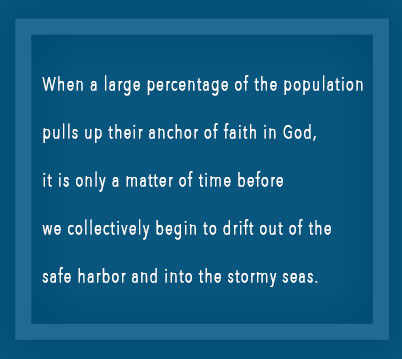
This week marks three years since Hurricane Harvey hit South Texas as a category 4 storm. It made landfall just north of our hometown and was the first major hurricane to hit our area in over forty-five years.
Our local communities had forgotten the amount of destruction such a massive storm could bring with its 140 mph wind gusts, tornados, storm surge, and torrential rainfall. To make matters worse, Hurricane Harvey gained most of its strength in a short period, growing from a tropical depression to a category 4 storm in less than 48 hours.
The small coastal towns that were devastated by Harvey have mostly recovered by now, but there is another storm brewing on the horizon. It is a global storm that looks on the outside like civil unrest, cultural revolution, government corruption, tyrannical oppression, and societal breakdown, with a pandemic thrown in for good measure.
Like Hurricane Harvey, this new storm threatens to go from inconvenient to devastating at a rapid pace. But unlike Harvey, the global storm in front of us is not driven by the wind and seas. It is man-made, and it stems from humanity’s loss of its moral compass and increasing rebellion against its Creator.
The Global God Divide
“For the mind set on the flesh is death, but the mind set on the Spirit is life and peace, because the mind set on the flesh is hostile toward God; for it does not subject itself to the law of God, for it is not even able to do so, and those who are in the flesh cannot please God.” Romans 8:6-8, NASB
The Pew Research Center conducted a worldwide survey last year asking people if belief in God is necessary to be moral. They call the report “The Global God Divide”. Here’s what they found: “Across the 34 countries, which span six continents, a median of 45% say it is necessary to believe in God to be moral and have good values.”
Particularly interesting for those living in North America, the survey reports, “Less than half in both Canada and the U.S. say belief in God is necessary to be moral (26% and 44%, respectively).” For Americans, this represents a 14 point drop from a survey conducted seventeen years earlier in 2002.
Across the globe, the survey shows a divide between younger adults (ages 18 to 29) and those age 50 and older, with the older generation more likely to affirm that belief in God is necessary to have morality and strong values. This pattern has held consistent for past analysis as well.
The significance of these statistics is not about whether an individual can have a moral framework while not believing in God. We have all met unbelieving people who are nice, law-abiding citizens. The Apostle Paul writes that “they show the work of the Law written in their hearts, their conscience bearing witness and their thoughts alternately accusing or else defending them, on the day when, according to my gospel, God will judge the secrets of men through Christ Jesus.” (Romans 2:15-16, NASB)
Lost at Sea
The true consequences of unbelief, however, can be seen on a societal level. When a large percentage of the population pulls up their anchor of faith in God, it is only a matter of time before we collectively begin to drift out of the safe harbor and into the stormy seas.

The moral drift happens slowly in the first generation, when those who have abandoned their parents’ faith still hold on to their parents’ cultural values and traditions. The next generation sees those values and traditions as barriers to their happiness and fulfillment and begins to dismantle them. Without revival, the process continues until there is virtually nothing left of the stabilizing, safeguarding influence of a widespread faith in (and fear of) God.
Today in the U.S., citizens are essentially divided in half, with the two sides engaged in a gargantuan battle of tug-of-war over the future of the nation. This polarization is usually defined in terms of a political or ideological divide, but in truth the divide is spiritual — regardless of whether the people on either side recognize that fact.
As Christians, we believe God is the author of morality, which He gives us in written form in the Holy Scriptures. Only societies that point their moral compass to God’s unchanging moral law can find a reprieve from the storm of lawlessness and spiritual rebellion.
Excluding God
A number of years ago we participated in a study called The Truth Project by Focus on the Family, which provided an excellent description of how contemporary culture has removed God from philosophy and ethics:
“…current thought pictures reality as a closed box—a cosmic cube—in which there is no room for anything that cannot be sensually or materially perceived. The problem is that with the lid of the box closed and God excluded, philosophy is deprived of a universal reference point and thus crippled in its ‘scientific quest for ultimate reality.’ As a result, it cannot answer the most basic questions about right and wrong behavior.”
When society takes God out of the picture, it loses its ability to define right and wrong. It turns to humanism and man’s attempt to achieve the greater good. The problem there is rooted in mankind’s sin nature. The entire human race is born sinful and corrupt from the womb.
“The wicked are estranged from the womb; these who speak lies go astray from birth.” Psalm 58:3
“If we say that we have no sin, we are deceiving ourselves and the truth is not in us.” I John 1:8
Without accepting Christ as personal Lord and Savior, mankind lives in hostility towards God and it leads to eternal death.
“For God so loved the world, that He gave His only begotten Son, that whoever believes in Him shall not perish, but have eternal life. For God did not send the Son into the world to judge the world, but that the world might be saved through Him.” (John 3:16-17)
There are a few things that we need to realize, if we are going to make progress out of the current situation.
1. The only way to solve a spiritual problem is through a spiritual solution. Our efforts need to be spiritual efforts and our battles need to be fought on our knees in prayer.
2. The people with whom we disagree are not our enemies. Our main concern is to bring the lost into the Kingdom of Light. When the Holy Spirit changes someone from the inside out, the political issues take care of themselves.
3. As we watch this storm rolling across the globe, we have to realize this is just the earliest rumblings of thunder. The true severity of the storm will be much, much worse and come much more quickly than we expect. (Even so, the storm will not prevent us from practicing points one and two above.)
God’s Shelter from the Storm
“He who does these things will never be shaken.” Psalm 15:5b, NASB
Throughout the Psalms, we read that God is our refuge and hope through any storms of life. So how do we make sure that we are staying in the shelter that He provides? Psalm 15 gives a beautiful description of what it looks like to walk in integrity and righteousness, and gives a promise of security to those who walk in God’s ways.
“O Lord, who may abide in Your tent?
Who may dwell on Your holy hill?
He who walks with integrity, and works righteousness,
And speaks truth in his heart.
He does not slander with his tongue,
Nor does evil to his neighbor,
Nor takes up a reproach against his friend;
In whose eyes a reprobate is despised,
But who honors those who fear the Lord;
He swears to his own hurt and does not change;
He does not put out his money at interest,
Nor does he take a bribe against the innocent.
He who does these things will never be shaken.” Psalm 15, NASB
We may not be able to stop the storm from coming, but praise God that we can be found unshakable in Him. The darkest hour for the world may yet be the brightest hour for God’s people.





